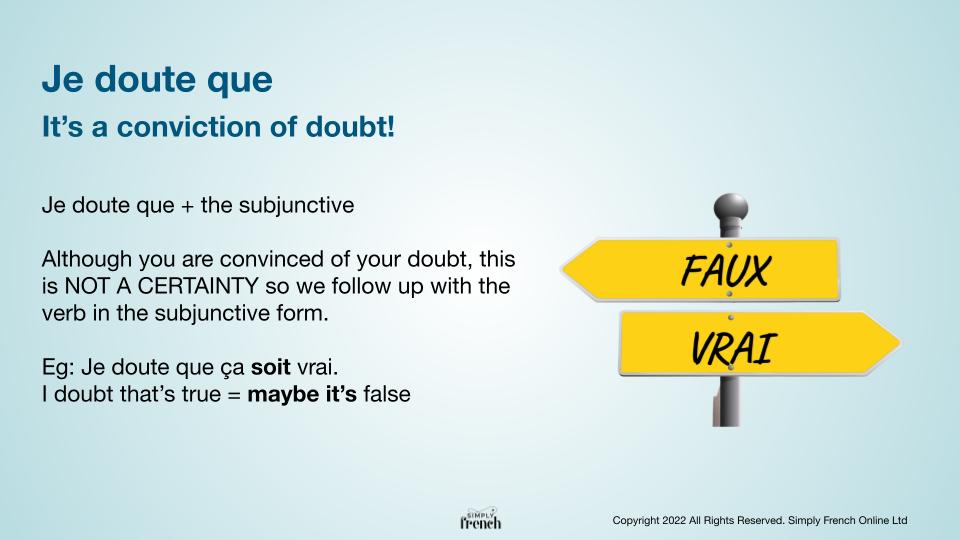Easy French subjunctive? I doubt it!
Mar 09, 2022Do you know how to express doubt in French? Do you have doubts about the French subjunctive? It’s perfectly normal.
Today, we’ll tackle how to express doubt in French.
Indeed, depending on the structure of the first part - positive or negative - the meaning differs and the tense in the second part of your sentence as well.
So, let’s analyse with examples and find a way to remember the various cases.

Does "douter" need the French subjunctive?
When it comes to using the verb “douter” in French, it can be very tricky. Let me explain why.
There are 2 main reasons: the meaning itself and the required tense.
First, when the sentence is positive, you are completely sure about…your doubt!
And because it’s uncertain, you will want the subjunctive.
Je doute que + the subjunctive
- Je doute que ça soit vrai >>> I doubt that’s true.
- Elle doute qu’il réussisse son examen >>> She doubts he passes his exam.

How to express doubt with negative sentences.
On the contrary, each time you express doubt with a negative structure, you are completely sure about what you are saying.
In other words, it’s a conviction of certainty (how ironic…)
That explains why you will pick the indicative mode since there’s no uncertainty.
Je ne doute pas + the indicative
- Je ne doute pas que c’est vrai >>> I am (very) sure it’s true.
- Nous ne doutons pas qu’ils peuvent le faire >>> We are (very) sure they can do it.

Using the subjunctive after opinion verbs.
Be careful, the above example was an exception. Generally speaking, with negative sentences with verbs like penser (to think), the subjunctive is compulsory for the simple reason it deals with uncertainty.
Therefore the formula is:
Je ne pense pas + the subjunctive.
- Je ne pense pas que ça soit vrai >>> I don’t think that’s true.
- Vous ne pensez pas qu’ils puissent le faire >>> You don’t think they can do it.

Expressing certainty and opinion in French.
If you wish to express your opinion and when you are fully sure about something, simply do it with “je pense que”.
Since it’s true to you, the mood you will use is the indicative mode.
Je pense que + the indicative
- Je pense que c'est vrai >>> I think that’s true.
- Elle pense qu’il réussira son examen >>> She thinks he will pass his exam.

Why the subjunctive goes with “not sure”.
As we have already seen, with negative sentences with opinion verbs or expressions, you’ll need the subjunctive.
In this case, the pattern “not sure” implies doubt. Hence the formula is:
Je ne suis pas sûr / sûre que + the subjunctive.
- Je ne suis pas sûr / sûre qu’il fasse beau demain >>> I’m not sure it’s going to be nice weather tomorrow.
- Elles ne sont pas sûres qu’ils peuvent le faire >>> They’re not sure they can do it.
Conviction of certainty with “sûr(e) que”.
As usual, whenever you desire to express your opinion, you’ll have the indicative mode.
Je suis sûr(e) que + the indicative
- Je suis sûr(e) qu’il fera beau demain >>> I’m sure it’s going to be nice weather tomorrow.
- Elle est sûre qu’il réussira son examen >>> She is sure he will pass his exam.

When the subjunctive expresses uncertainty.
Exactly like the previous example, the negative structure of “il n’est pas évident que” will be followed by the subjunctive.
So, the formula is:
Il n’est pas évident que + the subjunctive.
- Il n’est pas encore évident que cette épidémie soit encore finie >>> It’s not yet obvious that the pandemic has finished.

Certainty requires the indicative.
Another way to express certainty: with the expression “il est évident que” (it’s obvious that).
And the formula is:
Il est évident que + the indicative.
- Il est bien évident que cette épidémie est finie >>> It’s most obvious that the pandemic has finished.

Je doute que in action.
It was the first case we talked about. “Je doute” implies you are super uncertain. Consequently, you will follow up with the subjunctive after.
Je doute que + the subjunctive.
- Je doute qu'il pleuve demain >>> I doubt it will rain tomorrow.
- Vous doutez qu’ils puissent le faire >>> You doubt they can do it.

How to express certainty with a negative structure in French.
Time to study the negative version.
Remember that when it’s negative, we mean the opposite: we are certain about the doubt! Therefore the formula is:
Je ne doute pas + the indicative.
- Je ne doute pas qu'il pleuvra demain >>> I have no doubt it will rain tomorrow.
- Vous ne doutez pas qu’ils peuvent le faire >>> You have no doubt they can do it.

Indicative or subjunctive?
So, in this blog post we have seen how to express opinions and doubt.
Except for “je doute que” which is negative in some sense because it means I doubt, the other opinion verbs and expressions like “je pense”, “je trouve” (I find), “je suis sûr(e)”, “il est évident”, you will use the indicative.
However, the same structures in the negative form will require the subjunctive as they express uncertainty.

Now, if you have doubts about the subjunctive, I have several blog posts to help you:
How to express obligation and necessity with IL FAUT QUE
How to express uncertainty with IL SE PEUT
Simple Subjunctive I want you to in French
So, do you still have doubts?
Free Masterclass
Learn my 4 step method of how to hold meaningful french conversations the R.E.A.L. way in just 30 minutes a day.
When you signup, we'll be sending you weekly emails with additional free content


